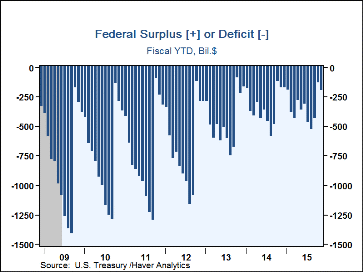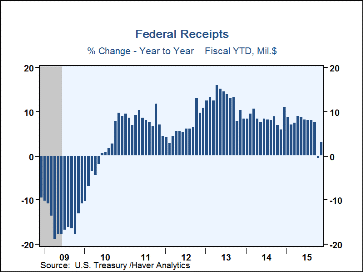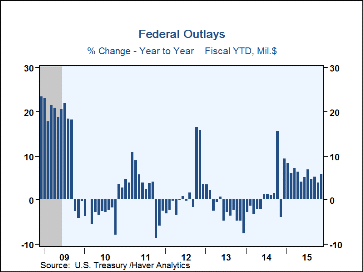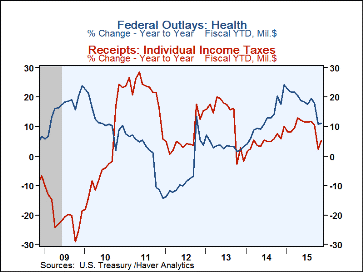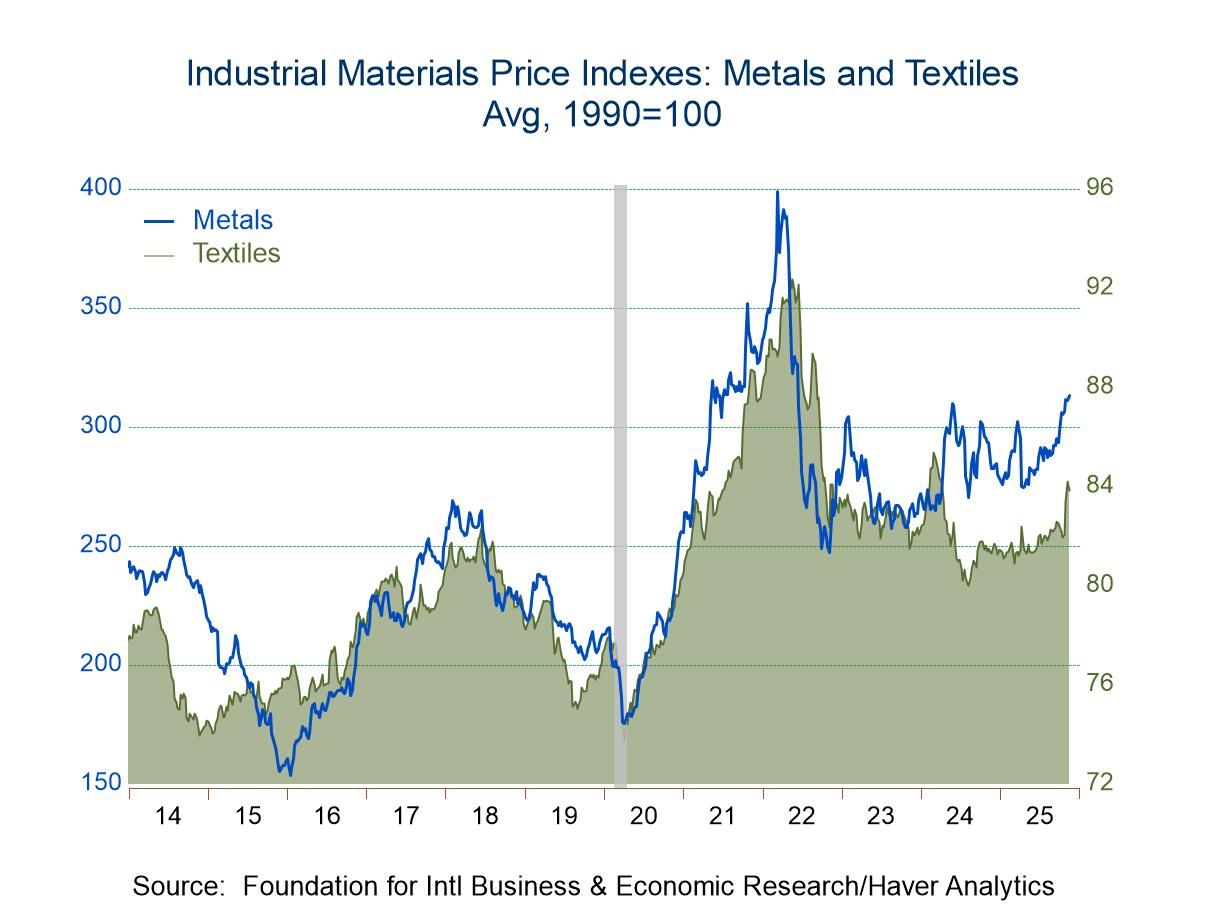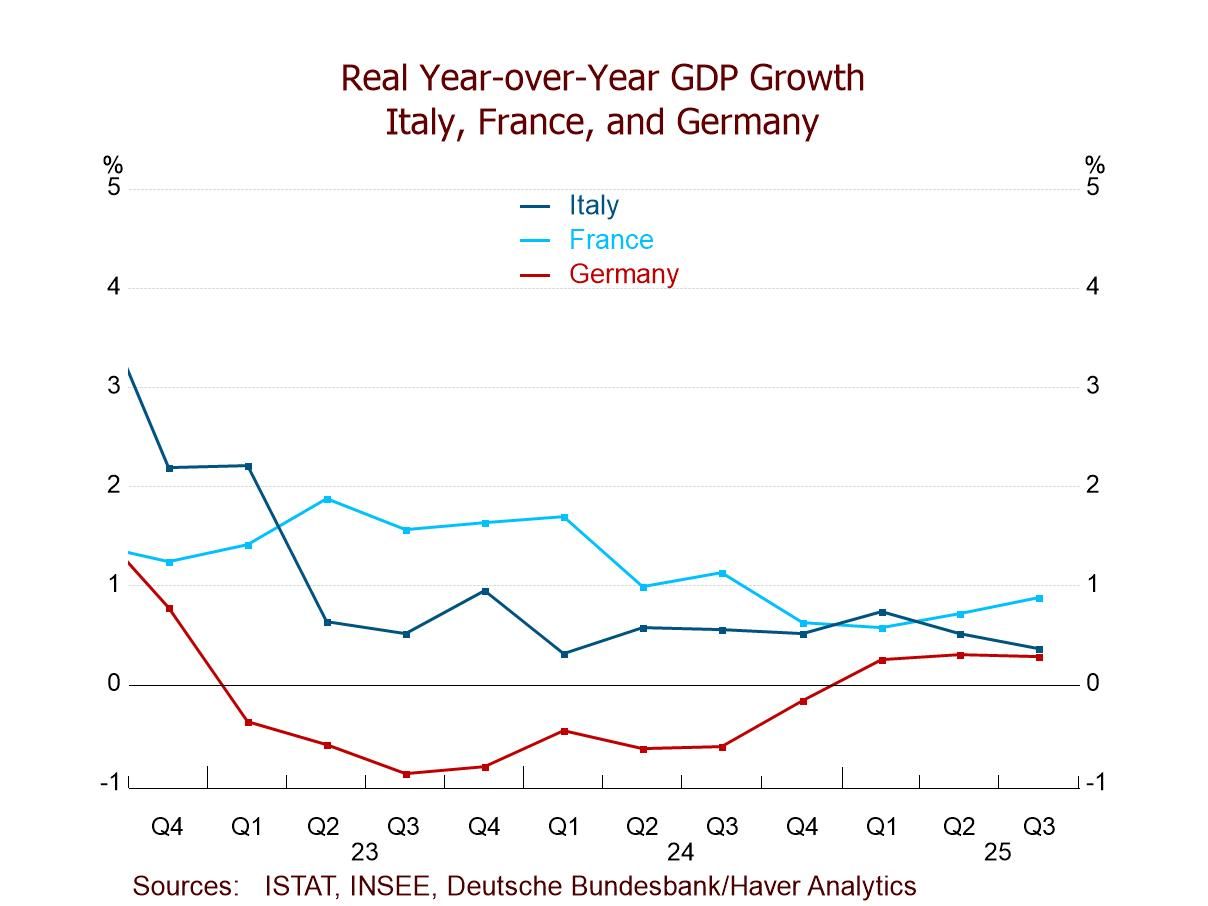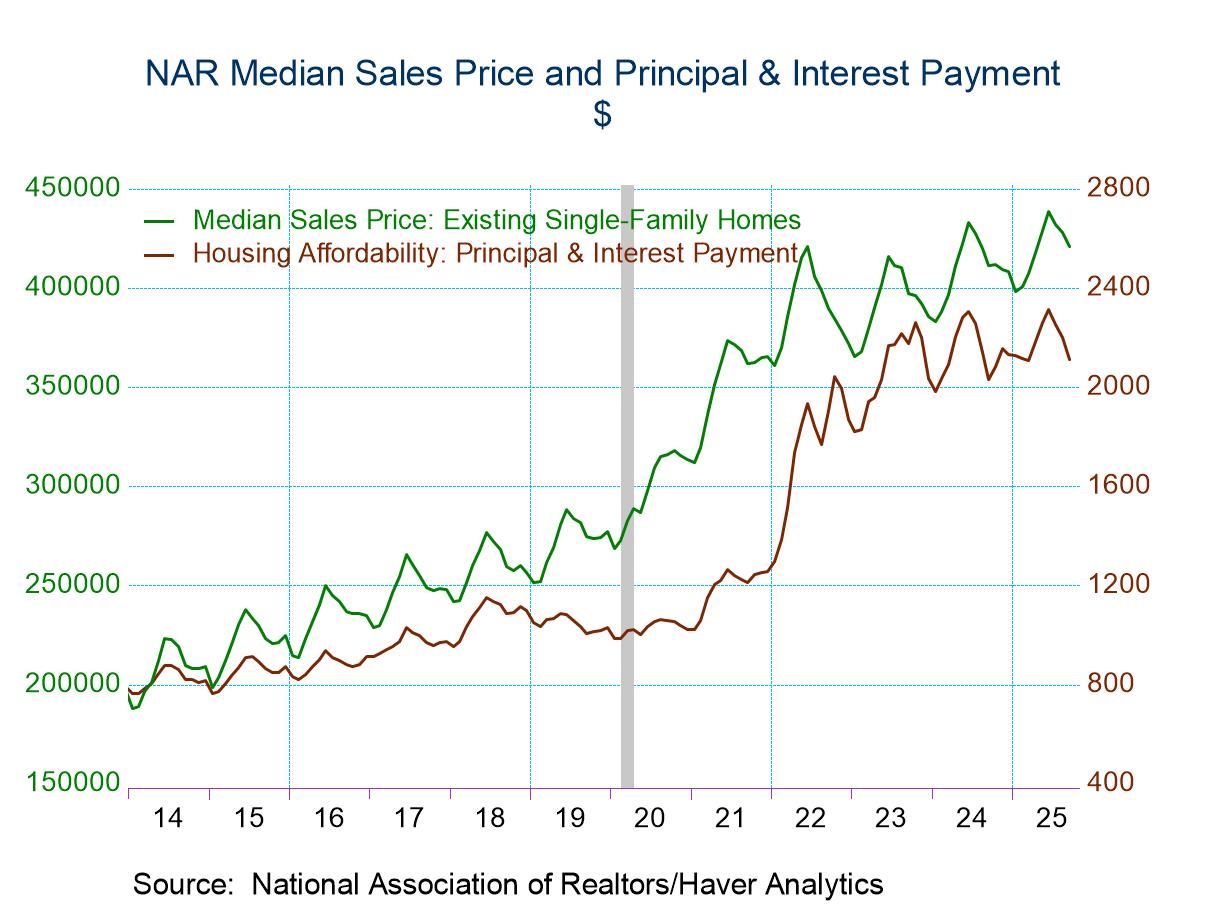 Global| Dec 10 2015
Global| Dec 10 2015U.S. Budget Deficit Deepens Y/Y
by:Tom Moeller
|in:Economy in Brief
Summary
The U.S. Treasury Department reported a $64.6 billion budget deficit during November, deeper than the $56.8 billion deficit twelve months earlier. A $68.0 billion deficit had been expected in the Action Economics Forecast Survey. In [...]
The U.S. Treasury Department reported a $64.6 billion budget deficit during November, deeper than the $56.8 billion deficit twelve months earlier. A $68.0 billion deficit had been expected in the Action Economics Forecast Survey. In the first two months of FY'16, the deficit deepened to $201.1 billion versus $178.5 billion during the same period in FY'15.
Overall revenues have increased 2.9% so far in FY'16 versus FY'15, dragged down by a 38.1% y/y decline in corporate income tax payments. Individual income taxes have increased a slightly improved 5.3% y/y. Growth in social insurance contributions of 6.0% y/y have accompanied a 0.3% y/y gain in excise taxes.
Government spending has advanced 5.9% y/y so far in FY'16, held back by a modest 2.7% y/y gain in defense outlays. Growth in outlays on health programs of 11.0% has been boosted by the Patient Protection and Affordable Care Act. Veterans benefits & services payments have grown 11.0% y/y. Medicare payments have risen a firm 8.7% y/y while Social Security spending growth has been steady at 4.3% y/y. Offsetting these gains have been a 9.2% y/y decline in education, training, employment & social services spending and a 2.4% y/y decline in income security payments with the lower unemployment rate. Interest payments also have declined 2.6% y/y.
Haver's data on Federal Government outlays and receipts are contained in USECON. Considerable detail is given in the separate GOVFIN database. The Action Economics Forecast Survey numbers are in the AS1REPNA database.
| United States Government Finance | Nov' 2015 | FY'16 YTD | FY'15 | FY'14 | FY'13 | FY'12 |
|---|---|---|---|---|---|---|
| Budget Balance | -$64.6 | -$201.1 bil. | -$438.9 bil. | -$483.4 bil. | -$680.2 bil. | -$1,089.2 bil. |
| As a percent of GDP | -- | -- | 2.5 | 2.8 | 4.1 | 6.8 |
| % of Total | Annual Change, YTD | |||||
| Net Revenues | 100 | 2.9% | 7.6% | 8.9% | 13.3% | 6.4% |
| Individual Income Taxes | 47 | 5.3 | 10.5 | 5.9 | 16.3 | 3.7 |
| Corporate Income Taxes | 11 | -38.1 | 7.2 | 17.3 | 12.9 | 33.8 |
| Social Insurance Taxes | 33 | 6.0 | 4.1 | 8.0 | 12.1 | 3.2 |
| Excise Taxes | 3 | -0.3 | 5.3 | 11.1 | 6.3 | 9.2 |
| Net Outlays | 100 | 5.9 | 5.2 | 1.4 | -2.4 | -1.7 |
| National Defense | 16 | 2.7 | -2.3 | -4.7 | -6.3 | -3.9 |
| Health | 13 | 11.0 | 17.8 | 14.3 | 3.3 | -7.0 |
| Medicare | 15 | 8.7 | 6.7 | 2.8 | 5.5 | -2.8 |
| Income Security | 14 | -2.4 | -0.9 | -4.3 | -1.1 | -9.1 |
| Social Security | 24 | 4.3 | 4.4 | 4.5 | 5.2 | 5.8 |
| Veterans Benefits & Services | 4 | 11.0 | 6.8 | 7.7 | 11.5 | -2.0 |
| Education, Training, Employment & Social Services | 3 | -9.2 | 34.7 | 25.9 | -21.9 | -10.3 |
| Interest | 6 | -2.6 | -1.8 | 2.8 | 0.4 | -3.0 |
Tom Moeller
AuthorMore in Author Profile »Prior to joining Haver Analytics in 2000, Mr. Moeller worked as the Economist at Chancellor Capital Management from 1985 to 1999. There, he developed comprehensive economic forecasts and interpreted economic data for equity and fixed income portfolio managers. Also at Chancellor, Mr. Moeller worked as an equity analyst and was responsible for researching and rating companies in the economically sensitive automobile and housing industries for investment in Chancellor’s equity portfolio. Prior to joining Chancellor, Mr. Moeller was an Economist at Citibank from 1979 to 1984. He also analyzed pricing behavior in the metals industry for the Council on Wage and Price Stability in Washington, D.C. In 1999, Mr. Moeller received the award for most accurate forecast from the Forecasters' Club of New York. From 1990 to 1992 he was President of the New York Association for Business Economists. Mr. Moeller earned an M.B.A. in Finance from Fordham University, where he graduated in 1987. He holds a Bachelor of Arts in Economics from George Washington University.


